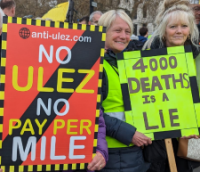Sadiq Khan's hated ULEZ expansion, and the authoritarian way he's pushing it through, will go down in history as an archetype of myopic, misguided, and deceitful policymaking.
It is not just that the expansion is incredibly damaging (to the point of sadism) to the small business community. Its rationale is based on manipulated and discredited data, while using shameful appeals to emotion. Perhaps worst of all, his unrelenting focus on extracting revenue from drivers ignores much more pressing transportation problems in the capital.
Let's start with the impact on small and medium-sized enterprises (SMEs), the lifeblood of the London economy. Small businesses relying on non-compliant cars or vans - everyone from plumbers to roofers to delivery drivers - will have to pay £12.50 every day they drive within the massively expanded Zone, or face fines of up to £160.
Most petrol cars registered since January 2006 are already ULEZ-compliant. Diesel vehicles, however, must meet the much tougher Euro 6 emissions standards. While most modern diesels are compliant, many older ones aren't. Smaller businesses are far more likely than large multinationals to have an older car or van - one of the 160,000 non-compliant vehicles that currently drive in the expanded Zone.
Small wonder that polling this summer found two fifths (39%) of outer London companies are worried the ULEZ expansion will negatively affect their employees, with the same proportion (40%) saying it would increase their costs. This tax is clearly deeply regressive, unfairly targeted as it is at SMEs who have already suffered so much in recent years.
According to Sadiq Khan, the destroyed livelihoods and shattered dreams of London SME owners are only so many broken eggs: a price worth paying for the omelette of reducing the 4,000 annual pollution deaths. Who - even a business owner facing bankruptcy - could object to such a noble cause? Especially when the Mayor uses the tragic and emotive death of nine-year-old Ella Adoo-Kissi-Debrah as a key justification for his pet policy?
Except the scientific data for ULEZ simply doesn't stack up. You wouldn't know it from the Mayor, but London's air is cleaner than at any point in the city's history, with levels of suspended particulate matter (SPM) just 2% of their peak more than a century ago. What then of the "4,000 lives lost" claim? This is a grossly erroneous, unscientific reading of the data.
The basis for this claim is a report commissioned by TfL and the Greater London Authority (both offices of the Mayor, so hardly non-partisan). As climate researcher Ben Pile explains, this report attributed an estimated 61,800 to 70,200 life-years lost to human-made PM2.5 and NO2. That is very different from the "statistical construct" of 4,000 dead bodies a year. A much more accurate figure is the loss of 69 hours of life per year for each of the 8.9 million Londoners.
This was only one of several serious problems identified by the committee's members, a significant minority of whom warned that the report's findings would "mislead the public into believing that exposure to long-term average ambient concentrations of NO2 is causally associated with an increased risk of death."
Such methodological sleight-of-hand could perhaps be forgiven if the existing Central London ULEZ were proven to improve air quality, but even here the data is lacking. Khan has claimed that ULEZ has led to "four million people breathing cleaner air" and "46% lower" NO2 concentrations. Yet as Pile shows, in the pre-ULEZ era there were just three operational roadside air-pollution monitors, two of which were sited next to road tunnels, and the other at a busy bus stop next to a traffic-light controlled junction.
For a policy with such wide-ranging ramifications, ULEZ should be based on much more rigorous and accurate data. Even better would be for the Mayor to scrap this illiberal, revenue-raising policy and instead focus on TfL's rarely-mentioned debt crisis. Since being allowed to borrow on the open market in 2003, TfL has racked up debts of over £13 billion.
That means there's little possibility of much-needed capital projects like the Bakerloo Line Extension and Crossrail 2 that would help take many more polluting vehicles off the capital's streets, while leaving a legacy Londoners can enjoy for decades to come. With the mayoral election looming, voters should choose a candidate with the moral courage to grasp the nettle of TfL funding reform - something that's eluded every incumbent since the modern office was invented.
Perhaps we shouldn't be surprised if politicians choose the easy road rather than the narrow path. But that doesn't make the impact of their decisions any less disastrous. Don't be deceived when Khan claims his ULEZ fiddle will lead to untrammelled benefits, it's London's SMEs that will burn.
Andreas Michli
Andreas Michli is a campaigner, businessman and, most importantly, a Londoner. As founder and CEO of Zone Gyms, he is as passionate about the health of the capitals' citizens as he is about its businesses.
Andreas has long been involved in grassroots politics. It was however the Covid lockdowns - when Londoners were not able to access facilities so important to maintaining their mental and physical health - that sparked Andreas' interest in becoming much more involved in politics.
Andreas believes that there is a large and growing disconnect between citizens and their elected representatives. One of the biggest democratic crises he identifies is the drift away from evidence-based policymaking in favour of partisan, ideology-driven politics.





